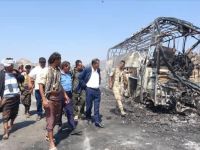Albawaba.Com
Cairo
Opposition leaders are calling for free and fair elections as Egypt gears up for a parliamentary vote to be held in three stages beginning next month.
The government announced its final list of candidates for the 444-seat assembly on Tuesday. The elections are scheduled for October 18, 29 and November 8. According to the state-owned Al Gomhuria newspaper, there are 444 candidates - the maximum - from the ruling National Democratic Party (NDP); 428 candidates from opposition parties; and a whopping 3,387 candidates running on independent platforms.
At a government news conference, the manager of the general administration for elections, Mahrous Shibayek, denied "the arrest of any member of the outlawed Muslim Brotherhood," stressing that "security organs will, during the elections, hold themselves to perfect neutrality, but won't tolerate any deviations from legitimacy."
According to Shibayek, the first phase of the elections would begin on October 18 in nine of Egypt's 24 governates: Alexandria, Ismailia, Port Said, Suez, Fayoum, Qena, Sohag, Baheera, and Menoufia, the last being home to most of the governing NDP's biggest players.
Shibayek said "voting cards are the right of every citizen who's registered to vote," adding "some of the names on the list [of candidates] were removed because their documents weren't in order ... but they have the right to protest this before special committees in local police stations. They also have the right to ask for an appeal in front of a judiciary committee."
Meanwhile, lawyer Noeman Gomaa, recently elected head of the opposition Wafd party, said that the upcoming elections would be "transparent and impartial." He added that this was "thanks to (Egyptian) President Hosni Mubarak's attention to the constitutional decision to have the judiciary oversee the elections," referring to a July court ruling that obliges the government to ensure - for the first time - that judges monitor voting throughout the country. According to a September 27 Reuters report, Gomaa said at the press conference Tuesday that he believes President Mubarak to be "honest and sincere in his desire for elections in reasonable circumstances and I understand that he has no problem with the Wafd taking one third, or a hundred, seats [in the assembly]."
The ruling NDP party won at least 94 percent of the 444 contested seats at the last poll in 1995, while opposition parties took 31 percent. Opposition figures later accused the government of rigging the elections, although Mubarak has called for this year's elections to be "free and fair".
A previous poll, held in 1992, was marred by violence that killed dozens of people as the government fought Muslim militants who had taken up arms against Mubarak's rule.
According to political analysts, the NDP seeks control of at least two-thirds of the People's Assembly, the margin required to approve nominees for presidential referenda.
In a front-page article in The Wafd, the party's mouthpiece, Gomaa is reported to have said that his party would "wade into the thick of the electoral fight with all of our strength, and insist on capturing at least a hundred seats in the parliament."
"This percentage of seats in the People's Assembly," Gomaa went on, "is considered the beginning of political stability and democratic reform." He then announced that the Wafd would present itself to the people of Egypt as an alternative to the political system which has run the country, and held 90 percent of seats in parliament, for fifty years.
He went on to confirm his party's rejection of further implementation of the emergency law, which has remained in force since Muslim militants assassinated President Anwar Sadat in 1981.
The law allows the authorities to detain suspects without charge for a renewable six-month period.
Meanwhile, in Wednesday's [Sept. 27] edition of the official government daily, Al Ahram, it was reported that the government has a new plan for giving thirty minutes of air time, on both radio and television, to all opposition parties contending for seats in the election.
The report said "the plan would allow the heads of different parties thirty minutes of radio and television time to explain their ideas and proposed programs and to encourage their candidates, without bias towards any of the parties."
© 2000 Al Bawaba (www.albawaba.com)







